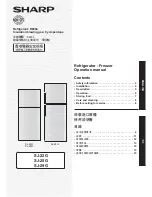
7
ENGLISH
IN
OUT
Fruit / Vegetables
Fruit and vegetables should be loosely enclosed in a
SODVWLFPDWHULDOHJZUDSEDJVGRQRWVHDODQGSODFHG
in the vegetable crisper to minimize moisture loss.
Dairy Products & Eggs
• Most dairy products have their best-before date on
the outer packaging which informs the recommended
temperature and shelf life of the food.
• Eggs should be stored in the Egg pocket.
Meat / Fish / Poultry
• Place on a plate or a dish and cover with paper or
plastic wrap.
•
)RUODUJHUFXWVRIPHDW¿VKRUSRXOWU\SODFHWRWKHUHDU
of the shelves.
• Ensure all cooked food is wrapped securely or placed in
an airtight container.
For best freezing
• Quality of food should be fresh.
• Freeze small quantities of food at a time in order to
freeze them quickly.
• Food should be properly sealed or covered tightly.
• Place food in the freezer evenly.
• Label bags or containers to keep an inventory of
freezing food.
Advice for preventing dew or frost
inside the refrigerator
• Keep the door securely closed. If the food falls down,
it may cause a gap between the cabinet and the door.
Move it back to the shelf or the pocket.
• Food with high-moisture should be stored in airtight
container or sealed tightly.
Note
• Evenly place the food on the shelves to allow the cooling
DLUWRFLUFXODWHHႈFLHQWO\
• Hot food should be cooled before storing. Storing hot
food increases the temperature in the unit and the risk
of food spoilage.
• Do not block the outlet and inlet of the cool air circulating
circuit with food or containers; otherwise the food can
not be evenly cooled throughout the refrigerator.
Do not place food directly in
front of cold air outlet.
This may lead to the food
freezing.
Refrigeration reduces the rate of food spoilage.
Ensure that the food is of the freshest possible quality to maximize the shelf life of perishable food.
The following is a general guide to help promote longer food storage.
Storing food
Do not place food on shaded area.
This may lead to the food freezing.


































